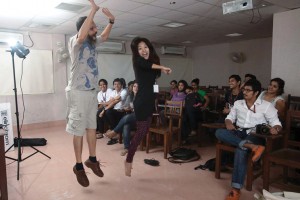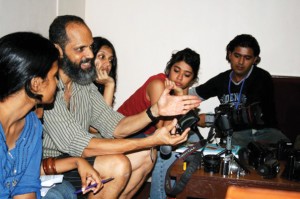 Photographer and professor David de Souza, loved by his students for his unique teaching methods, shares his observations and experiences as a teacher
Photographer and professor David de Souza, loved by his students for his unique teaching methods, shares his observations and experiences as a teacher
On Why He Started Teaching
Like most things in my life, I did not ‘seek’ teaching. Someone from KC College called me out of the blue and that began a decade of enjoyment. I did not know how to ‘teach’ or did not have a method; in fact, I did not know that I could teach. All that I did know was that I did not want to teach as I had been ‘taught’, i.e. in a formal teacher/student template.
A Teacher He Remembers
I was taught by a lady called Daphne Correa in school who was marvellous, she obviously loved what she did and she loved students, her geography lessons, the principles of which stay with me today, tectonic movement and why Newfoundland is a famous fishing ground were so compelling and beautifully told that one sat bolt upright in her class and was transported to new lands and climates. It all became fascinating and understandable and logical and lyrical. And you never felt castigated or little for not knowing; she was a true educator in the best of the tradition.
On His ‘Unique’ Teaching Methods
You know the great thing about being unique is that you don’t think that you are being unique, you do what you think comes naturally, that others think it unique is all for the good, but I don’t think, when setting out to class, that I am going to be ‘unique’. I do what I do. But I take it as a compliment.
I feel I approach photography from a non-theoretical point of view, which is exactly the way I practice it. I feel the theorists and academics came after the practitioners. So the people in the arts and sciences DID, and what they did later was ‘theorised’ and put into textbooks.
Theory DIMS Spontaneity
I am not opposed to theory, but I feel that subjects like photography in particular, should begin by doing and not being clouded by a ‘theory’; a more spontaneous outburst is what I look for first. Then we can apply theory to that outburst. Often, I feel that theory dims spontaneity and joyful outbursts.
On ‘De-Schooling’
It is my belief, and there is enough and more empirical data to show, that school and ‘schooling’ drums out creativity. “We all are born artists, staying an artist as we grow is the issue,” said Pablo Picasso. I can’t agree more. In fact the word ‘school’ actually means conformity, at least in the Indian context, all designed with good intentions to serve the jobs produced out of the industrial revolution, cookie-cutter education where people are ‘replaceable’ since they are all made to do the job in a ‘standardised’ way.
I find that anathema to the idea of original thought and freedom of expression. So I work on the premise of ‘de-schooling’ after having found a book, many years ago, on the footpath that seemed to talk to my soul called De-schooling of Society by Ivan Illich and another by him called Celebration of Awareness.
I do not look for technical excellence, in fact I am very surprised when I see it. In a short semester from November to March with a Christmas vacation and enough college festivals in the way, what would you rather use me for, a technical guide, that is easily performed by YouTube or an instigator into the world of ideas and philosophy? So yes, a few complain, but there will always be someone who complains if God almighty would descend from the heavens. So I roll on regardless. However, that does not mean I am impervious to questions about technique, the class of 60 can be a damn good resource and then if all else fails, I’m there.
No Such Thing as Healthy Competition
I hate the word competition, which is built into our survival or so we are told by Darwin. My feeling is if it’s ingrained and there in our genes and happens willy nilly, then why buy more of it if it can be avoided. I have a ‘theory’ that competition necessarily breeds a rival and I don’t particularly believe in the ‘healthy rival’, that’s an oxymoron.
Is it possible to engender original thought, most certainly, but the overriding experience in a student’s life is competition and marks and grades. So it’s a strategy they employ to gain more marks but has nothing to do with original thought. Fear is the biggest operative: what if I fail, what if I’m wrong? That’s the biggest hurdle for any original thinker. The word ‘loser’ acted out with an ‘L’ on your forehead is the most disgusting sign I see played out in a borrowed American fashion, again indicating a copy cat, herd mentality. I abhor it.
The Highs and Lows of the Profession
The most gratifying aspect I think for any teacher is to see the scales fall from students eyes when they start to believe that ‘I can do that’, or that’s a fine new way of seeing or thinking, that’s the moment every teacher lives for. It may not happen in the time span that you’d want it to, but it happens in what the aboriginals call Dream Time, a time when it has to happen. It’s the biggest thrill for any educator. The most demanding part is to flow against the tide, to believe in oneself and to move on when everything else around you is against the grain, the system of marks, of grades, of attendance and those things that the administration thinks important.
To Improve the Quality of Teaching in India
Firstly, if teachers are paid more, then there is a greater chance that you will attract the right people into the profession. You can’t expect mere dedication alone, and this is applicable in any sphere. Especially in education, teachers should be paid very well, to start with. The selection process of faculty is critical to the ideology of an institution. You have to hire people who are like minded and will take the brunt of free and original expression even when it hurts. And it’s imperative to start at the beginning, at kindergarten, and move all the way to secondary and tertiary processes.
The Change in Students Over the Years
I see less hunger and more affluence, which are directly related. Affluence could be a great resource or a terrible burden; it’s up to the creative teacher to use those resources. But affluence also breeds apathy, and this is very hard to overcome. It can drag the whole class down. I see less hunger, that’s very disappointing, but I also see things are cyclical and have faith in time itself.
Don’t Call Me ‘Sir’
Demanding respect is the sure fire way of not getting it, my ‘theory’ borne out of experience is that if you want power, then give it away. It comes back in more than full measure. You don’t demand respect, you earn it. Then whether students call you ‘sir’ or ‘David’ has nothing to do with it, it’s the tone in which it is said, that makes the difference.
Also, in India, so much hierarchy is built into our sociology. I think it comes in the way. I prefer a more egalitarian approach and think the American universities, in this regard, have got it right. I like to adopt that approach.
An Inspiring Student
One of my students, Sachin from KC, did not have a camera and borrowed a digicam from a friend. But when the end results did not turn out to his satisfaction twice over, he went to YouTube, made a pin hole camera with a match box, electrical tape and kitchen foil, and made truly astounding photos that gave him a standing ovation that he did not expect. It was a very special moment. I have many such stories.
The Greatest Lesson He’s Learnt
To have few expectations and listening can be more active and creative than speaking.
A Piece of Advice He Gives His Students
I show them the Steve Jobs convocation address at Stanford. It summarises exactly what I feel and is said far better than I would attempt, ‘Stay hungry, stay foolish’.
Volume 2 Issue 3




























